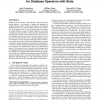Free Online Productivity Tools
i2Speak
i2Symbol
i2OCR
iTex2Img
iWeb2Print
iWeb2Shot
i2Type
iPdf2Split
iPdf2Merge
i2Bopomofo
i2Arabic
i2Style
i2Image
i2PDF
iLatex2Rtf
Sci2ools
118
click to vote
DAMON
2009
Springer
2009
Springer
Cache-conscious buffering for database operators with state
Database processes must be cache-efficient to effectively utilize modern hardware. In this paper, we analyze the importance of temporal locality and the resultant cache behavior in scheduling database operators for in-memory, block oriented query processing. We demonstrate how the overall performance of a workload of multiple database operators is strongly dependent on how they are interleaved with each other. Longer time slices combined with temporal locality within an operator amortize the effects of the initial compulsory cache misses needed to load the operator’s state, such as a hash table, into the cache. Though running an operator to completion over all of its input results in the greatest amortization of cache misses, this is typically infeasible because of the large intermediate storage requirement to materialize all input tuples to an operator. We show experimentally that good cache performance can be obtained with smaller buffers whose size is determined at runtime. We d...
Cache | Cache Miss | DAMON 2009 | Informatics | Temporal Locality |
Related Content
| Added | 26 May 2010 |
| Updated | 26 May 2010 |
| Type | Conference |
| Year | 2009 |
| Where | DAMON |
| Authors | John Cieslewicz, William Mee, Kenneth A. Ross |
Comments (0)

